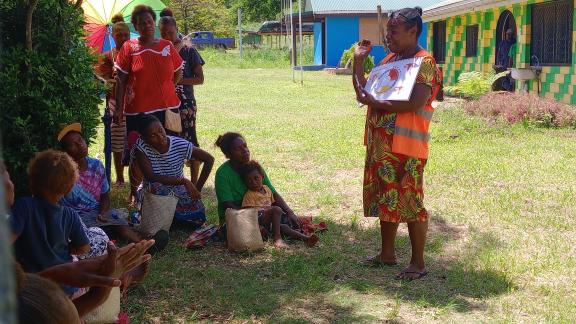Girls and women from nearby villages flock to mobile health clinics set up by the Vanuatu Family Health Association (VFHA). The response team from VFHA consists mostly of women, who have already been away from their families for over six weeks. Team Leader, Enneth Ilaisa, mentally prepares her team for the long day ahead.
The 12-member team, consisting of nine women and three men, have been conducting community outreach on Tanna Island, Vanuatu since 28 March 2023, as part of their humanitarian response to Tropical Cyclones Judy and Kevin, which tore through Vanuatu.
“Our team consists of nine mothers who have left their families to provide these essential services to vulnerable communities. When people visit us, we must put on a happy face to make them feel welcome but sometimes it gets hard,” says Ilaisa.
Ilaisa said that the women in the medical team have been away from their homes for so long that their husbands would sometimes be overwhelmed with looking after the children and often would call the women on the team ‘selfish’ for choosing to leave their families.
Sexual and reproductive health nurse, Cindy Mahi, said she sometimes feels bad for leaving her partner alone to look after the children. When she sees clients with their children, she says she feels homesick.
“I call my family every morning, and sometimes my husband complains about me being away – and it really hurts, especially if I hear my children in the background asking when I will be back. I feel so guilty sometimes as a mother!” says Mahi.
Ilaisa added that the stress from leaving their families is compounded by an intense working environment delivering vital sexual and reproductive healthcare to remote communities.
“Our work is such that we leave our accommodation before sunrise and return after sunset. People are very tired and sometimes we are so busy helping clients that we often work through lunch to ensure we help everyone,” says Ilaisa.
Mahi said that these are things people don’t see when they come to receive services.
“When women come to see us for help, we put on a warm smile, but they do not know about the hardships we face. They do not see what is running at the back of our mind.”
Ilaisa said when it comes to the mental health of the team, she ensures she is creating a safe space where her team members can openly share.
“I offer counselling to them, and I encourage them to share the important work that they do in the field with their husbands, so they know exactly what they do. I sit there and listen to them and sometimes we cry together.”
Ilaisa said that apart from counselling, she encourages the mothers to practice self-care by taking the weekend off and making sure they take adequate breaks throughout the day.
“I tell them, if you feel you need to take a break in the middle of work – do it! When we debrief after our field work, we share the numbers of women who received SRH services, and the feeling of accomplishment is what makes our work worthwhile. When we hear these numbers it reminds us of our purpose, it reminds us of why we are here, and for a second, our family problems fade away because we know we are serving a purpose greater than ourselves.”
when
country
Vanuatu
region
East and South East Asia and Oceania
Subject
Humanitarian
Related Member Association
Vanuatu Family Health Association








